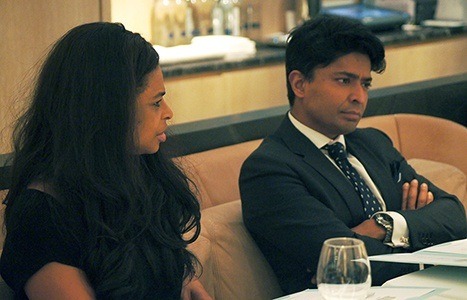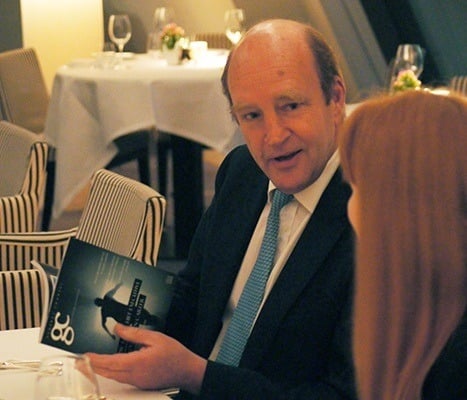Participants
Catherine McGregor, editor-in-chief, GC magazine
Orijit Das, European general counsel and vice president, Genpact
Sarah Davis, group commercial legal director, Guardian Media Group
Craig Stoehr, chief corporate officer and general counsel, Thomas Cook
David Webster, partner, RPC
Venue
Angler, South Place Hotel, London
Catherine McGregor (CM): It would be interesting to get a perspective on what the concept of value means to each of you, just briefly.
Sarah Davis: In our business, which is a very innovative, fast-moving, future-looking business, the essential value to the business is them understanding and believing that you are aligned with them, and that you are on track and spotting their issues for them, and you are helping them remain future-focused. It is less and less to do with the output. Actually, the output is a given.
Orijit Das: We have been around for the last ten years as an independent company, and we have grown from a £500m to a £2.2bn-odd company. For us, value has been around how the legal team facilitated the growth and helped preserve the culture of compliance. The team has been batting on the front foot in respect of compliance, assisting the company in facilitating that culture of growth and non-negotiable compliance.
David Webster: One thing we have seen is that general counsel in particular are a form of antennae for their businesses. GCs use their networks to identify and find out what is happening within their particular industries. You talk to your peers about what is happening. That network and the intelligence it brings is really helpful in terms of feeding back into the business what is happening within your particular sectors.
Craig Stoehr: For us, it has been a bit of an education to the business people that value means more than just saving money or generating revenue, but it is managing risk and adding value in other ways, in terms of commercial advice and things like that. Part of it is also efficiency and how we can get things done faster and be an enabler as opposed to an inhibitor of things that are going on.
CM: Obviously the world has become much more focused on regulation and compliance. From your perspectives, how much has the business caught up with that?
Craig Stoehr: I think compliance is particularly difficult. I look at data protection. For us, this is a big issue, because we are a consumer brand. If you have an incident, in two years somebody could fine you 5% of your gross turnover – it is a real business issue. If you are not secure and safe for the customer, you are going to create a lot of damage. I think there is a heightened awareness, but you have to translate: it is not just purely legal; it is a business issue. How do we deal with things from the business perspective and do things that are right for the customer?
Orijit Das: At Genpact the tone is set right at the top. This is best illustrated with an example where in a sales conference our CEO Tiger Tyagarajan was asked what kept him up at night. He responded: “The business is doing well, but what does sometimes worry me is that the world we operate in today is very unforgiving when it comes to a compliance breach. That is the one torpedo that can sink the ship.” It particularly gladdened my heart to know that that is the importance the CEO gives to compliance. This culture did not forge itself overnight. There is a huge amount of work that goes into it. It is under the surface, and there is a reason why this ship is afloat: because people are working below the water level.
CM: Do you feel that your own perceptions of what adding value means have changed as your roles and your companies have changed?
Sarah Davis: I started working for The Guardian 14 years ago. It was a national newspaper. It is now a global media business, but I still have a legal team that fits that business. That has not happened by accident; that has happened by anticipating what it is the business is going to need. That looking-over-the-horizon piece I think is the value. Being aware of the pressure points for your business, which are different in different business units and different areas – but you have to know where they are.
CM: Craig, in recent times you have been wearing more of a dual hat and have been more focused on the business side. Has that changed how you consider what value has been added at all?
Craig Stoehr: What I have found is that the view of in-house lawyers held by people in continental Europe is much different than, say, in the US – where your general counsel will sit on boards, and partners in prominent law firms will sit on boards. They are respected as part of the business team. I found in continental Europe it was very much: “Oh, you are a lawyer. We call you in when there is a legal issue and we do not talk to you otherwise.” It is changing mindsets, it is changing to: “These people can bring a view that is not purely legal but is business, is commercial and is understanding the customer.”
David Webster: Over the last ten or 12 years, my view from the outside is that the position in Europe, and certainly in the UK, has been getting better, in the sense that I think general counsel are having far more influence and getting more involved in the business than they were. It strikes me that there is a much greater appreciation of the value that they bring to their businesses. If you look particularly at the insurance sector, most of the boards will have a general counsel sitting on them these days.
Sarah Davis: I think there is something about in-house lawyers and lawyers generally being prepared and comfortable to advise beyond the legal issue. In fact, the business wants it and they appreciate it when you offer your judgement as well.
Craig Stoehr: I do think that a lot of times, lawyers, just because of their training, tend to prepare better for a lot of things. That is how you can stand out. The most prepared person in the room is usually the one that gets what they want and sets the agenda.
CM: Are there any tactics that people have developed as to how they can encourage a culture within their team of thinking about how they are adding value to the business?
Craig Stoehr: I produce a quarterly report that everyone who works for me contributes to, that has a very tangible and intangible value-add piece.
Orijit Das: What we do is sell complex business services through an instrument called the master services agreement. Most of these contracts tend to be very competitive. The problem is that when you go and compete, the lawyer for the client typically says: “That position is market.” Very often the sales teams end up believing that. We decided to hold a “market positions” roundtable under Chatham House Rules. We invited leading experts from key law firms, we took several positions often seen in contracts and said: “This is our position. Do you think that is market?” That exercise very quickly brought out for the sales team what is generally considered to be a market position. There was the added value of being able to tell the sales team: “Some of the positions you are told are market positions are not market standard”. That exercise may not have directly brought in any revenue, but boy was that exercise successful. The slides from the roundtable were immensely helpful and proved to be a hit.
David Webster: Adding value comes in many forms as a private practice lawyer. Firstly, it is about being able to apply the knowledge you have built up working with myriad clients to help the specific businesses you are advising. There’s an onus on us in private practice to put that know-how into an easily digestible format. In-house teams often don’t have the time or the resource to do it, so we can add value by making life easier for them. In general, we are finding that our value-add is increasingly taking on different forms to what it used to. Nowadays, it tends to be much more imaginative. There’s definitely a growing interest in us helping to provide fertile networking opportunities for GCs and in-house lawyers, facilitating introductions and so on. More and more we are delivering bespoke training for the business, too – and that can be as much for, say, the sales team as directly for the legal team. For some legal departments, that takes a big strain off training they might have previously delivered themselves. In the past there wouldn’t have been as much opportunity for us to interact with the business, but now there seems to be a greater acceptance and willingness to put us into the business to help and to build relationships, so that we can advise them directly if necessary. What’s more, it just gives us a better understanding of how everything operates, which is all part of being able to deliver proper commercial advice.
CM: Is that something that everyone is finding is becoming quite common with external advisers, or are some external advisers more truly business partners than others?
Sarah Davis: I currently do not have any relationships with firms that do not get it. We have met very little, if any, real resistance to that. That tells you something about where law firms are as well. We need support to get to the solution, and part of that is the legal advice, but it is not the entirety. We do have our external lawyers come in to do the training. In my experience, if you have a sophisticated internal client that has a mature attitude towards using legal services you can let the client instruct the external lawyers directly, but if you do not have that, then that loss of control can become a problem that itself needs to be managed.
Craig Stoehr: We set it all at group level, because I do not think people are good managers of lawyers. What I have seen in the past is, if you let people instruct somebody, what will happen is they are not a good manager of the outside counsel and the outside counsel many times is not a good manager of their own. The next thing you know, you end up with this huge bill.
Sarah Davis: We did a lot of work with the firms that our business goes to directly in transferring our DNA to those law firms so that they could be instructed directly. We spent a lot of time working with the external lawyers before we then let the business loose on them, and it has worked very well, but I think it took a lot more time than we expected it to. If your team is instructing external lawyers, then you are the quality control factor in there, but if you take your team out then the external lawyers need to be confident that they can work as an extension of the legal team.
CM: Are there any top tips on how you can demonstrate the less tangible parts of where the value proposition lies and, David, how are you as an external advisor able to demonstrate that you can add value and really be a business partner?
Sarah Davis: Being involved in or working with a policy team or a lobbying team if you have one, is a really good way of demonstrating value. As the lawyer, you know about legislation. If you can affect incoming legislation on behalf of your business, that is a really big win and it is really well understood.
Orijit Das: If your efforts are going towards furthering the culture of compliance, then you are doing well. I think in this day and age – in the post-banking-crisis world – most companies get that if they do not have that culture of compliance they are heading towards a disaster.
Craig Stoehr: We have this saying: “What gets measured gets done.” On the legal side, we measure a lot of things. With the reports we do quarterly, it is not all about: “What money did you save?” But: “How did you drive some efficiency?” Or: “What intangible value do you think that you added?”
David Webster: Aside from what we’ve discussed before, I think the most basic way in which we can add value is to provide very good, very clear, and very commercial advice in a way that is completely digestible by the client. That might sound a bit basic, but we must make sure that you, as GCs, don’t have to waste time translating our advice into a form that can be understood across the business. We are always trying to find ways to add value that are interesting, innovative and practical. Our clients accept that value is something that is not just about the rates that they are paying, it is everything else that goes with that as well. The provision of legal services is not just about advising on law; it is about helping in the implementation of that advice and making sure that advice is being communicated properly.
Sarah Davis: At the end of a large deal we have a threshold for significant contracts, and we will ask the law firm to produce a risk review document. It is a simple thing, but we have had to tell our lawyers: “Actually, this is how we like to be communicated with.” I just think it is about telling your external advisers what value is to you, and they will shift and present that. I do not think there is any magic to it. I have yet to work with a firm that is not receptive to that and that does not get it.
Craig Stoehr: Some people cannot get their head around the fact that I do not want a 20-page memo. I want an email of two paragraphs, and that is it.
Sarah Davis: The advice in and of itself is interesting to me because I am a lawyer and I find law interesting, but actually I just want the solution. But I want to know that you have done it, because otherwise you are just guessing. So if you need to, you can show your workings. I think that is a shift, because for lawyers in private practice the value has come from being knowledgeable and being expert. We are now requiring experts to do something that does not give them the opportunity to show their expertise. I think that, actually, is quite a challenge.
Orijit Das: I once asked whether a certain activity came within the purview of a regulator. We ended up receiving a very long memo. It was very knowledgeable, it was very detailed, the gentleman – a very senior regulatory lawyer – produced a sterling piece of work. When that expert opinion was circulated within the company, people’s eyes glazed over after the second page. Unfortunately that memo failed in its intended purpose.
Craig Stoehr: You have to expect that you have hired the people that know all the stuff underneath. Ideally, if you have been in the business for long enough, you know when the distillation is just a very good summary that they have probably gone through many times internally to get to: “This is what I know my client wants to know.”
Sarah Davis: I do think it is important to let your advisers know what your own risk appetite is, because you are asking them to match that, and that is where they get their comfort from as well. I think it has to be a two-way thing; you have to be fair with your advisers and say: “This is how I want my X.” It is not an invitation to leave things out, but I think it sets the tone of: “I am just asking you for a really punchy summary and we can bottom it out later.” But I also think actually that one’s business wants both things: they want brevity, but they absolutely want you to be all over it. You have to wear being a lawyer quite lightly, but there are times when you have to put on the lawyer. Sometimes your client might pull you in a direction you do not want to go. As GC, you are very close to the business, but you are still independent and you have an independent function.
CM: That’s a key issue in your roles isn’t it? How do you balance being a strategic advisor and remain an independent voice?
Craig Stoehr: You have to be able to raise your hand and go: “I can bend here and there, we can figure out a good solution to do this, but, sorry, we just cannot do that.”
Sarah Davis: And: “This is also me adding value, because this is sustaining the business.”
Orijit Das: I have form for saying: “The officers of a company will not look very fashionable in orange jumpsuits.” It tends to grab attention when needed.
Craig Stoehr: It tends to get the attention of the directors when you say: “You could be personally liable. You could go to jail.” I also think though, if you are generally practical in finding solutions, when you do raise your hand, they will listen to you more.
Sarah Davis: Yes. Actually, there is something quite bonding about having worked with the business and tried really, really hard to help them find a way to do something but actually maybe you just cannot get it done. The respect that you get from your business colleagues as being the person that really cared about that, that is really annoyed that you have not been able to get that thing done the way you wanted to do it, and that came up with the solutions and with alternative ways of doing it. I think it is quite compelling for the business to see that you really care about what it is they are trying to do.
Orijit Das: I think one area where the in-house lawyer brings solid value is being able to say: “That is an acceptable risk.” The external lawyer may not be able to gauge the internal attitude to a certain risk. That judgement call, based on your deep working knowledge of law, compliance, your business and the sector you operate in, and being able to put it into a pithy “yes” or “no”, is a huge value that you bring to the business.
Sarah Davis: In fact, I would go a bit further. The sweet spot is when, because of your knowledge and expertise (both legal and of your business), you can be a bit more risk-inclined than your client. When you have a client saying: “Oh, I am not sure,” and as a lawyer you are saying: “That is okay, you can do that.” That is very powerful.



